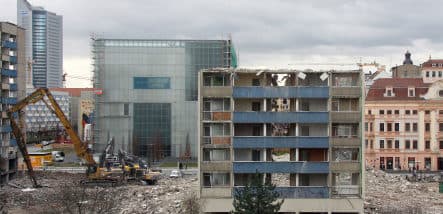Official wants 50,000 empty west German flats demolished

While the sight of wrecking balls smashing down blocks of prefab flats is not an unusual one in eastern Germany, now a call has been put out for up to 50,000 apartments to be torn down in western towns.
Lutz Freitag, president of the Federal Association of German Flat and Property Companies, says a combination of a shrinking population and an increasing tendency for people to move into big cities has left tens of thousands of properties empty.
Left uninhabited, the flats, which are often decrepit to start with, deteriorate and become unusable and derelict, ruining their areas.
“Around 50,000 flats in western Germany must be taken from the market,” he told Die Welt newspaper.
He called for money to be invested in tearing down these flats, saying the imbalance between funds set aside for such projects in the east and west must be evened out. The government has earmarked €58 million for restructuring in the west, compared to €104.8 million in the economically depressed east.
“Until now public funding (in the west) has been largely restricted to dismantling industrial or military areas,” he said.
Around half of the companies represented by his association have flats or houses which are never likely to be rented out – because they are old, or are in areas where demand is low and shrinking.
The troubled port city of Bremerhaven is singled out as a good example of a middle-sized town in western Germany where the problem is particularly acute. A total of 1,400 flats have already been torn down there in the last five years, but the population – and with it the budget of local authorities – is still shrinking. The number of empty flats increased from 3,700 in 2002 to 5,400 in 2006, to represent around eight percent of the total.
Increasing numbers of people are leaving smaller towns and villages, for the cities, where 40 percent of all jobs are to be found, the newspaper said.
Around 70 percent of the German population still live outside the big cities, meaning that many commute – or are likely to move to cut out that commute in the light of increasing fuel prices.
Freitag warned that investment in tearing down unwanted buildings now could save money in the long term. “It is clearly more expensive to revive a run-down area than it is to prevent its collapse in the first place,” he said.
Comments
See Also
Lutz Freitag, president of the Federal Association of German Flat and Property Companies, says a combination of a shrinking population and an increasing tendency for people to move into big cities has left tens of thousands of properties empty.
Left uninhabited, the flats, which are often decrepit to start with, deteriorate and become unusable and derelict, ruining their areas.
“Around 50,000 flats in western Germany must be taken from the market,” he told Die Welt newspaper.
He called for money to be invested in tearing down these flats, saying the imbalance between funds set aside for such projects in the east and west must be evened out. The government has earmarked €58 million for restructuring in the west, compared to €104.8 million in the economically depressed east.
“Until now public funding (in the west) has been largely restricted to dismantling industrial or military areas,” he said.
Around half of the companies represented by his association have flats or houses which are never likely to be rented out – because they are old, or are in areas where demand is low and shrinking.
The troubled port city of Bremerhaven is singled out as a good example of a middle-sized town in western Germany where the problem is particularly acute. A total of 1,400 flats have already been torn down there in the last five years, but the population – and with it the budget of local authorities – is still shrinking. The number of empty flats increased from 3,700 in 2002 to 5,400 in 2006, to represent around eight percent of the total.
Increasing numbers of people are leaving smaller towns and villages, for the cities, where 40 percent of all jobs are to be found, the newspaper said.
Around 70 percent of the German population still live outside the big cities, meaning that many commute – or are likely to move to cut out that commute in the light of increasing fuel prices.
Freitag warned that investment in tearing down unwanted buildings now could save money in the long term. “It is clearly more expensive to revive a run-down area than it is to prevent its collapse in the first place,” he said.
Join the conversation in our comments section below. Share your own views and experience and if you have a question or suggestion for our journalists then email us at [email protected].
Please keep comments civil, constructive and on topic – and make sure to read our terms of use before getting involved.
Please log in here to leave a comment.